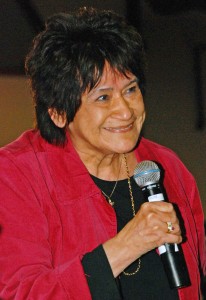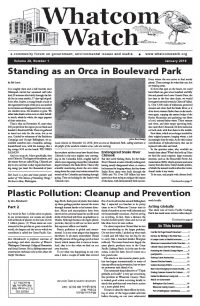by Lorraine Loomis
The strength of the late Billy Frank Jr.’s vision and leadership is once again being called upon to help recover salmon in western Washington.
Habitat, hatcheries and pinnipeds will be the focus of the Billy Frank Jr. Salmon Coalition that is now taking shape. It stems from two events in the past year that offer renewed hope for salmon recovery.
The first was the inaugural Billy Frank Jr. Pacific Salmon Summit in March. State, local and tribal government officials, conservation groups, sport and commercial fishermen, and others participated in a day of talks to inspire, enlighten and ignite cooperative efforts to restore salmon and their ecosystems.
The second was a public information session for non-Indian sport and commercial fishermen held in April during the annual North of Falcon salmon season negotiations. The ongoing decline of the salmon resource has frustrated all fishermen — treaty tribal, sport and commercial — because of steadily decreasing harvest opportunities.
Instead of pointing fingers, sport anglers, commercial fishermen, and tribal and state fisheries managers focused the discussion on areas of common ground and shared pain.
We agreed to meet our difficult-but-necessary tasks head-on by bringing together leaders and innovators across policy, science, politics, business, conservation, recreational and other areas who are willing to challenge the status quo.
We know that the main cause of the salmon’s decline is not fishermen. The real causes are: • The ongoing loss of salmon habitat.
• The need for more hatchery fish to make up for lost natural salmon production.
• The need for effective management of an overpopulation of pinnipeds such as harbor seals and California sea lions.
On salmon habitat, the coalition will focus on protecting riparian (streamside) areas by advocating for uniform science-based requirements across the region. That means creating healthy streamside buffers with plenty of mature trees that help keep water temperatures low, stabilize riverbanks and contribute to diverse instream habitat for salmon. Healthy habitat is critical to both naturally spawning and hatchery salmon.
A land-use permit tracking and accountability system is needed to coordinate the monitoring of permits issued by the state through the Shoreline Management Act and Hydraulic Project Approval programs and other regulatory processes to better inform local and regional land-use decisions.
We also have our sights on changing the “no net loss” standard for salmon and their habitat under the state’s Growth Management Act. That’s business as usual and a recipe for continued failure. Instead, we will advocate for a state standard that requires a “net gain” because that is the only way to move forward on salmon recovery.
The nonstop loss of salmon habitat prevents development of self-sustaining salmon populations. Until habitat can be restored, hatcheries will remain key to salmon recovery. The coalition will support additional state, federal and other funding for increased salmon production and maintenance of state, federal, tribal and nonprofit hatcheries in the region. We will also support increased hatchery production of chinook to aid the declining southern resident killer whale population.
Meanwhile, predation by an overpopulation of pinnipeds on both adult and juvenile salmon is slowing recovery of weak salmon populations.
We know they are eating far more salmon than are harvested by fishermen. We need to assess just how many seals and sea lions there are in western Washington and gauge their impact on salmon recovery. We will develop management recommendations to maintain sustainable pinniped populations that support salmon recovery efforts.
You’ll be hearing more about the Billy Frank Jr. Salmon Coalition in the months and years ahead as we work to honor his core beliefs: Tell your story. Tell the truth. Work together. Stay the course. Work together.
This is how we will recover salmon and their habitats.
__________________________________________
Lorraine Loomis is chair of the Northwest Indian Fisheries Com-mission, www.nwifc.org.





























